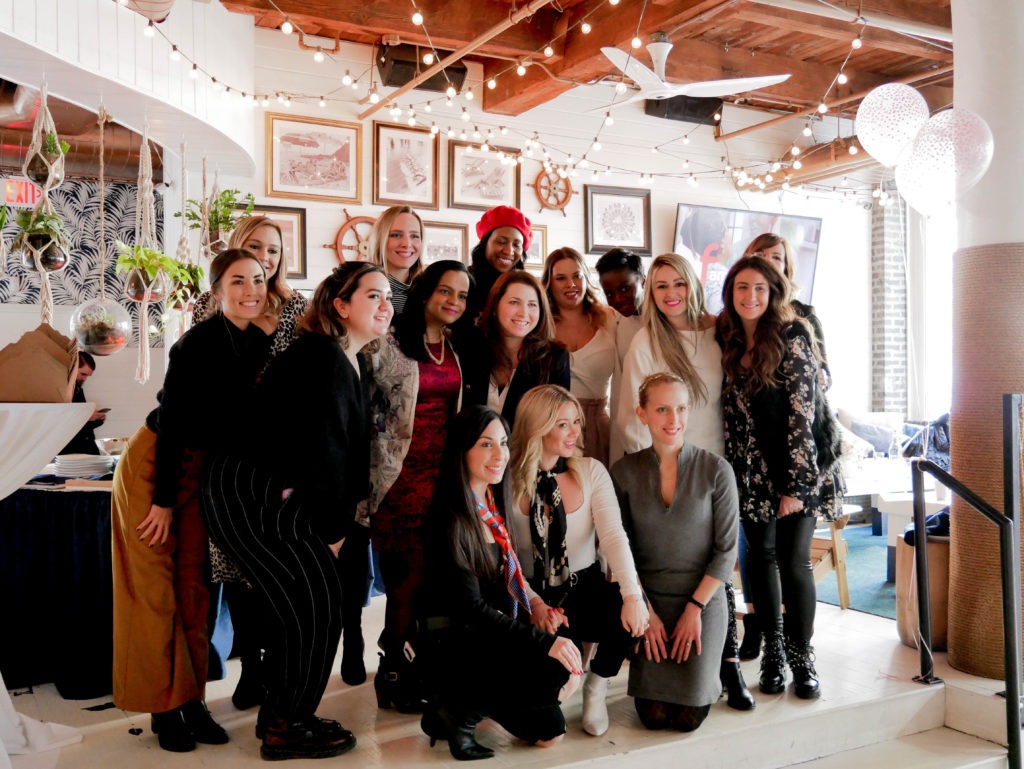There comes a time in a Doll’s life when the notion of starting a family becomes a reality. Oooooh the F word! It’s not what you’re thinking…. Well, sort of. Fertility. This exciting time comes with a flurry of excitement, anticipation, and confusion. Caitlin and Danielle were fortunate enough to have brunch (hosted by CCRM, a leading pioneer in fertility science, research and advancement) with a group of Chicago Dolls and an expert on the subject, Dr. Laxmi Kondapalli to discuss fertility, fertility treatment, family planning and more. Things got real.

Since 1 in 8 couples are impacted by infertility, we decided it was time to learn all we can to help normalize the conversation and share with you the options we learned and believe. #LetsTalkFertility


CCRM is encouraging people to speak more openly about infertility. Because it’s an issue that affects men and women equally, CCRM wants to remove the negative stigmas and barriers that stand in the way of prospective parents and help people feel comfortable opening up about fertility and family planning.


Trying to conceive is a very exciting time, but we quickly have found out that one size does not fit all. There are so many things that have to go right in order to conceive naturally – it really is the miracle of life. We wish all Dolls everywhere started their families the good ole’ fashion way, but there are many reasons why this isn’t the case.

Dr. Kondapalli works out of Denver at CCRM . Although CCRM does not have a facility in Chicago, more fertility specialists in Chicago refer to CCRM in Denver than any other facility. We met in Chicago at the super instagrammable spot, Hampton Social with our questions in hand.


Here’s what we’ve learned.
Infertility is diagnosed if you are under the age of 35 and tracked your cycle for one year trying to get pregnant, this has to take place during your ovulation window of your monthly cycle. If you are over 35, the window shortens to six months.
Oh how the tables have turned. Haven’t we all had those moments when we think back on how we have tried to avoid pregnancy? Now in our child bearing years, we are all learning it may not be that simple.
Here’s where to start:
Know your cycle schedule! Some women have 28-day cycles while others may have a 21-day cycle or a 35-day cycle. Your cycle length may change overtime due to age and hormonal fluctuations.
Ovulation happens 14 days before your period starts and you have three days of being fertile. This isn’t a lot of time so you’ve got to get busy…(wink)! Usually the 12th, 13th and 14th days is when it happens. If you’re on a 35-day cycle, you’ve got to get busy on the 19th, 20th and 21st days of your cycle.
Here are some ways to track your cycle at home:
1) Take your BBT – Your Basal Body Temperature (BBT) is the lowest body temperature attained during sleep. You can measure your BBT by taking your temperature immediately after waking up – before you brush your teeth, before you check your phone, before your feet even hit the floor. Keep your thermometer next to your bed to record your temperature and then log it.
Ovulation may cause a slight increase in basal body temperature.
You’ll be most fertile during the two to three days before your temperature rises. By tracking your basal body temperature each day, you may be able to predict when you’ll ovulate. In turn, this may help you determine when you’re most likely to conceive.
2) Take home ovulation tests – Ovulation tests are used to determine your fertile days so you can maximize your efforts in trying to conceive. These tests detect a surge in the luteinizing hormone (LH), which occurs a day or two before ovulation. This can be helpful to know when determining the best time to get it on.
Keep Track! There are a few great apps that you can keep on your phone to help organize all this data. We like Flo and Ovia.
If you’ve tried the above methods and you’ve reached a standstill, we recommend seeing a fertility specialist like CCRM .
What you can expect at your first visit:
A fertility assessment – You and one of CCRM’s team of award-wining physicians such as Dr. Kondapalli will discuss your health history and will perform some testing. After the results are in, they will literally draw you a plan. We are talking a legit map of what is going on with your fertility, the work that needs to be done in order to conceive and the treatment plan of how to get there. You can even frame it and hang it in the nursery!
IVF: Your eggs are extracted and prepped for pregnancy outside the body, combining your partner’s sperm with your egg. The fertilized embryo is then placed back in your body, hoping to create a successful pregnancy. Read the full process here: https://www.ccrmivf.com/services/ivf-fertilization/
On the other end of the spectrum there are Dolls who one day want a family but aren’t ready to have a family due to career, dating life and timing. For fertile women, your 20’s and 30’s are a fantastic age to freeze them to use later on when you are ready. Here’s what you should know about freezing your eggs:
We are born with a set amount of eggs and everything we are exposed to on a daily basis plays a role in the life of our eggs. What we understand is you inject yourself with hormones to amp up your egg production and have a procedure performed to extract the eggs. They are stored at the clinic until you are ready to use them. This way you can go on your merry way not worrying about your biological clock ticking. Read more here: https://www.ccrmivf.com/services/elective-egg-freezing/
You can check with your insurance to see what will be covered and what is not covered. CCRM also offers financing options.
The most important take away is that like most other things in life, although you have this desire to be in a certain place in your journey, you still need to relax and have fun with where you are at… Keep trying to conceive and if after a year you are still not pregnant, reach out to CCRM. They’ve worked many miracles! CCRM’s industry-leading approach to fertility research and treatment offers prospective parents the fastest path to the healthiest baby. CCRM offers a full suite of fertility services, innovative technology, and cutting-edge labs. It specializes in the most advanced fertility treatments, with deep expertise with in vitro fertilization (IVF), fertility assessment, fertility preservation, genetic testing, third party reproduction, and egg donation.
There are so many great options and ways to achieve the life you deserve.

Do you have a fertility story? Leave a comment below or send us an email! We would love to chat with you.
I love seeing people open up about this. I have had no struggles but know several who have
Recently knew this from a friend. I did not knew that age really does affect that. Thank you for adding details to that.
I am so glad that there are places to help ladies have a baby. I had to have help with baby number 4.
This is a great post. How interesting! I love that you are creating a healthy and open conversation about infertility. Thanks for the tips!
This very interesting and can be a taboo topic but you discussed it with high respect and grace. Great job!!
Thank you so much for being so open and willing to discuss this topic! Family planning can be so painful for a lot of us, especially when we think we are in the struggle alone.
Yes, people don’t open it up easily. This is a nice step to bring them together and learn how to overcome it with the right knowledge.
I have a very good friend who also used IVF
method to have a child. She always updates me on what’s going on and it was a total success. The baby is now one year old.
Great tips in this post about infertility. loved how warm and welcoming the conversation is set in a fun setting.
Great post. I will share it with my wife and across my network. Thanks a lot.
I know a few people that’s going through this. Great Article it’s not a topic you here alot of people speak on.
Although I think conversations around infertility have grown, it still shouldn’t be a taboo subject. It happens to more couples than most people know and the more we talk about it the less alone we will feel.
It is very important. I think we should be ready to speak up for infertility issues and trouble having a baby overall
We thought we were going to have to go through all of that due to my ex’s ovarian cyst issues. Thankfully we had a child relatively quickly. Although we never did have another. I can imagine the ups and downs gone through when you are trying to have children and it’s difficult.
Interesting read, on a topic that can be difficult to talk about…
Thank you for being strong and sharing this! A lot of families and couples faces the same issues.
Very insightful entry regarding infertility… these days fertility issues are now coming out of the surface and I’m really happy that people are now accepting the reality that these do happen… and there’s nothing bad in trying to do tests and a lot of work-up for fertility. Really great post!
Unless until people talk about an issue, it can never be resolved. It’s good that now people have awareness and they are willing to talk about infertility and things related to it.
Such an important topic, more and more women struggle with infertility! Your article is definitely informative!
This is a very useful and practical post. Thanks for spending the time to write out such detailed information.